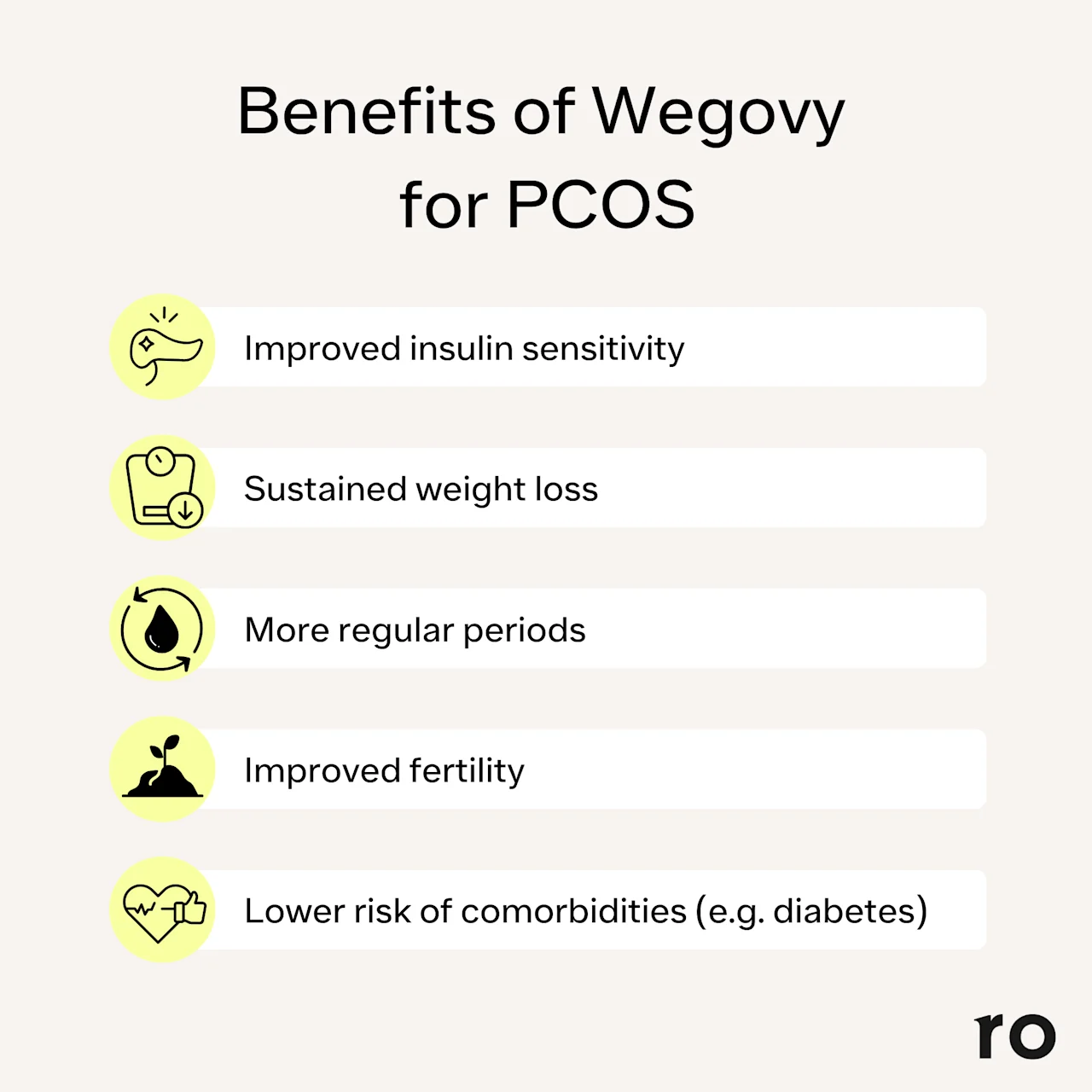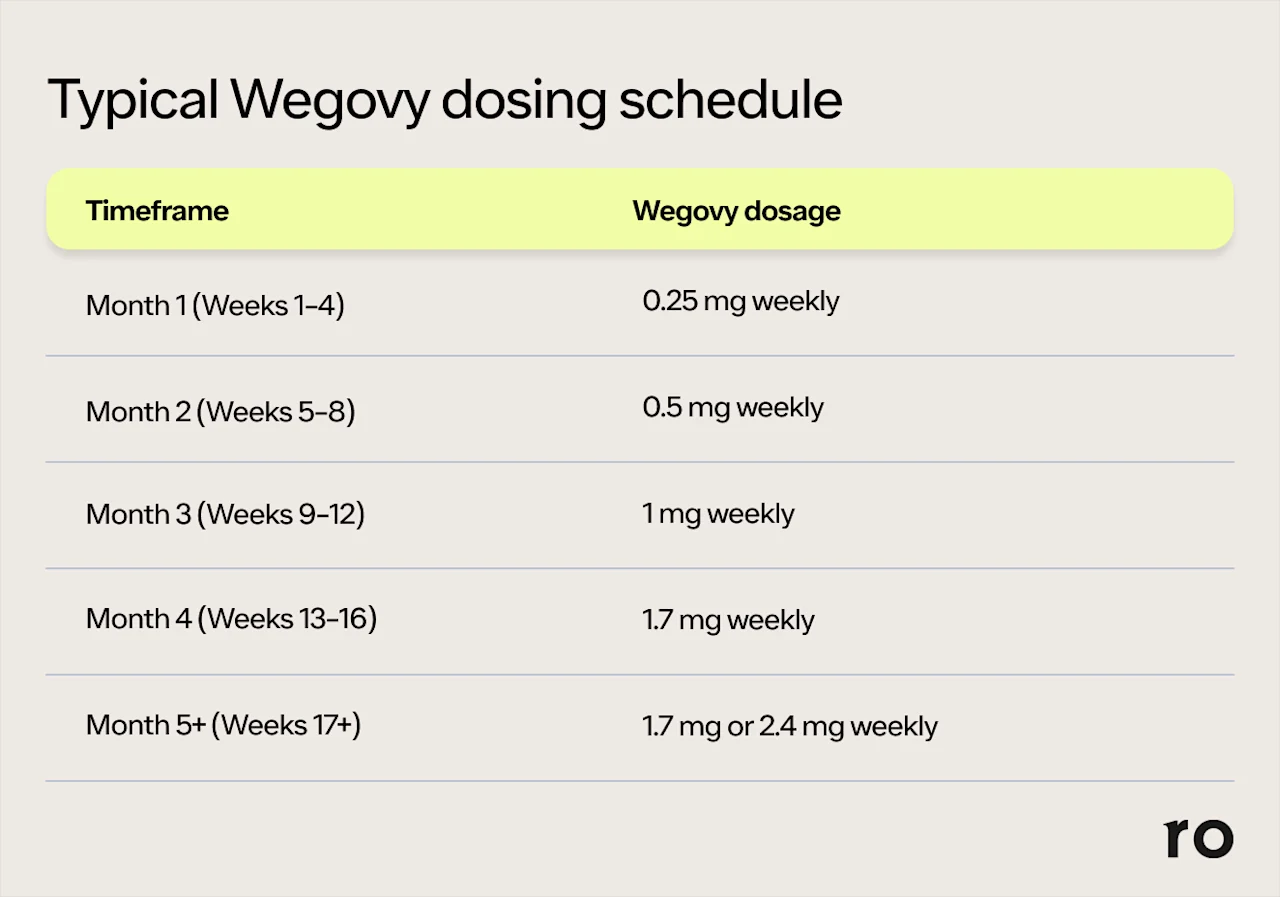Key takeaways
Wegovy can be prescribed off-label for PCOS to manage PCOS-related weight gain and insulin resistance, but it is not FDA-approved for this use.
Some research suggests Wegovy may improve PCOS symptoms like irregular periods, fertility issues, and metabolic health by promoting weight loss and improving insulin sensitivity.
Women with PCOS who meet certain weight-related criteria may qualify for insurance coverage of Wegovy when prescribed for weight loss, depending on the details of their insurance plan.
Here's what we'll cover
Here's what we'll cover
Here's what we'll cover
Key takeaways
Wegovy can be prescribed off-label for PCOS to manage PCOS-related weight gain and insulin resistance, but it is not FDA-approved for this use.
Some research suggests Wegovy may improve PCOS symptoms like irregular periods, fertility issues, and metabolic health by promoting weight loss and improving insulin sensitivity.
Women with PCOS who meet certain weight-related criteria may qualify for insurance coverage of Wegovy when prescribed for weight loss, depending on the details of their insurance plan.
By now, you’ve likely heard about Wegovy for weight loss. But what about taking Wegovy for PCOS, or polycystic ovary syndrome?
PCOS affects up to 20% of women of reproductive age. Yet there aren’t any medications approved by the US Food and Drug Administration (FDA) to treat it. The first-line approach is usually lifestyle changes like diet and exercise. But when they don’t work, or in addition to these tactics, healthcare providers may also prescribe drugs off-label to help manage PCOS symptoms like weight gain. One such option is Wegovy.
Emerging research suggests taking Wegovy for PCOS can be effective, and interest in the medication as a treatment is growing. Want to learn more? Read on as we dive into how Wegovy can help manage symptoms of PCOS, whether insurance will cover it, and more.
Can you take Wegovy for PCOS?
Yes, you can take Wegovy for PCOS — as long as it’s prescribed by and under the supervision of a licensed healthcare provider. That being said, Wegovy is not FDA-approved to treat PCOS, so taking it for the condition would be considered an off-label use of the medication.
The GLP-1 is approved for weight loss and management in adults with obesity or overweight and at least one weight-related condition. And being that PCOS is commonly associated with stubborn weight gain and difficulty losing weight, semaglutide (the active ingredient in Wegovy) can be a helpful tool for addressing those symptoms and, in turn, managing the condition.
Not only is weight gain a symptom of PCOS, but it can also worsen the disorder and exacerbate other symptoms, such as insulin resistance, irregular periods, excess androgen (aka “male” hormone) levels, and infertility. The more excess weight you gain or carry, the worse your condition can get — and the (vicious) cycle continues. But if you’re able to get your weight under control — such as with the help of a drug like Wegovy — you can improve PCOS-related symptoms and support your overall health.
“When prescribing Wegovy off-label for PCOS, I assess several key factors, including the patient’s BMI (body mass index), insulin sensitivity, metabolic markers (such as glucose and lipid levels), and their overall reproductive goals,” says Armando Hernandez-Rey, MD, a board-certified reproductive endocrinologist and infertility specialist. “A good candidate is typically someone with obesity or overweight who has not responded well to lifestyle changes alone and shows signs of metabolic dysfunction [such as weight gain and insulin resistance] commonly seen in PCOS.”
While the specific criteria used when prescribing Wegovy off-label for PCOS varies, many healthcare providers, such as Dr. Hernandez-Rey, consider BMI. Typically, they’ll look to see if a patient has a BMI of 30+ (i.e. obesity) or 27+ (i.e. overweight) and at least one weight-related health condition, such as diabetes, high cholesterol, or high blood pressure.
Potential benefits of Wegovy for PCOS
Weight loss is often recommended to individuals who have obesity or experience weight gain with PCOS. There’s only one problem: Having PCOS makes it harder to lose weight due to insulin resistance and hormonal imbalances. That’s where appetite-regulating medications like Wegovy may help.
Wegovy may offer several benefits for people with PCOS, particularly when lifestyle changes alone haven’t led to weight loss:
Improved insulin sensitivity. Wegovy helps the body release insulin more effectively, improving blood sugar control — a primary concern for many people with PCOS.
Sustained weight loss. Wegovy slows down digestion and reduces appetite, helping to lower caloric intake in the long term.
More regular periods. Losing weight and reducing insulin resistance may help restore ovulation and regulate menstrual cycles in folks with PCOS.
Improved fertility. Wegovy-driven weight loss may improve fertility in PCOS patients, which may be a possible benefit for those who are trying to conceive.
Lower risk of comorbidities. Managing weight with Wegovy may also help reduce some of the long-term risks associated with PCOS, such as type 2 diabetes and cardiovascular disease.
Dr. Hernandez-Rey agrees that Wegovy can offer several off-label benefits to women with PCOS. “Most notably, Wegovy supports weight loss, which can significantly improve insulin resistance, a core issue in many cases of PCOS,” she says. “By reducing insulin resistance, Wegovy may help regulate menstrual cycles, decrease androgen levels (which are associated with acne and excessive hair growth), and potentially improve fertility outcomes.”

Wegovy and PCOS: research
In clinical trials of Wegovy in people with obesity, the medication led to an average weight loss of 15% in about a year and a half. Most of the participants were women, including some with PCOS. As for research on Wegovy and PCOS, specifically? There are only a few studies, but their results thus far seem promising.
For example, a small study of 27 women with PCOS and obesity found that taking a low dosage of semaglutide (the active ingredient in Wegovy) led to an average weight loss of almost 17 pounds in three months. Nearly 80% of the participants lost at least 5% of their body weight in that time frame. Those who lost at least 5% of their initial body weight continued taking Wegovy for another three months, at which point they had lost a total of 25 pounds. Moreover, 80% of the participants stabilized their menstrual cycles and many saw their fasting blood sugar levels improve.
While the study has limitations (e.g. small in size), the fact that most women lost at least 5% of their body weight in just three months is a big deal. Here’s why: For people with PCOS and obesity or overweight, shedding 5%--15% of body weight within six months is commonly recommended to improve symptoms such as irregular periods, insulin resistance, infertility, and other issues related to high androgen levels. In this study, semaglutide helped people reach that minimum target in half the time.
Researchers have also found that GLP-1 medications, such as Wegovy, led to significant weight loss, improved insulin sensitivity, and more balanced hormone levels in people with PCOS, according to a review.
While more research is needed, these results suggest that Wegovy, along with other GLP-1 drugs like Ozempic, may have a lot to offer when it comes to treating PCOS. And in 2023, the American Society for Reproductive Medicine updated its treatment guidelines for PCOS to include weight loss medications like Wegovy and Saxenda (liraglutide).
Wegovy dosage for PCOS
There is no Wegovy dosage specifically for PCOS since it isn’t approved for this use. However, most healthcare providers, including Dr. Hernandez-Rey, may use the standard dosing guidelines for weight loss when prescribing Wegovy to their patients with PCOS. This usually starts with a dose of 0.25 mg weekly for four weeks. Then, under your healthcare provider’s guidance, you’ll increase the dosage every four weeks until you reach a maintenance dosage of 1.7 mg or 2.4 mg weekly.
Since PCOS can present differently from person to person, your treatment plan should be individualized. “Dosing can vary depending on how the patient tolerates the medication,” Dr. Hernandez-Rey says. “It’s essential to closely monitor for side effects and adjust the approach as necessary.”

How long does it take Wegovy to work for PCOS?
Wegovy reaches peak concentration in your body within 1–3 days of your dose, but most people find it takes at least a few weeks before they notice a change in their appetite and body weight.
While weight loss timelines can vary from person to person, the following should give you an idea of how quickly Wegovy can work in general (and, thus, potentially for PCOS):
In the aforementioned study of women with PCOS, participants lost over 16 pounds in the first three months. Many participants' fasting blood sugar levels normalized within that time. Menstrual cycles also became regular for most participants (80%) within 3–6 months.
In a study of Wegovy in people with obesity or overweight (but not necessarily PCOS), participants lost almost 6% of their body weight at three months, and nearly 11% at six months.
In a large clinical trial (again in people with obesity or overweight, but not necessarily PCOS), participants lost 2% of their body weight within the very first month.
Wegovy side effects
The most common side effects of Wegovy include:
Diarrhea
Vomiting
Stomach pain
While rare, serious side effects may include:
Vision changes (in people with type 2 diabetes)
Pancreatitis
Kidney or gallbladder problems
Increased heart rate
Suicidal thoughts or behaviors
Stay in touch with your healthcare provider as you take Wegovy for PCOS, especially if you experience any concerning side effects or simply want tips for managing them. They can advise you on what to do or adjust your dosing schedule to give you some relief.
Will insurance cover Wegovy for PCOS?
Typically, insurance will not cover Wegovy for PCOS since it is prescribed off-label. However, if it’s prescribed for an FDA-approved condition, Wegovy may be covered, depending on the details of your insurance plan. When Wegovy is covered by insurance, it’s usually under these scenarios:
It must be prescribed for an FDA-approved use, such as cardiovascular risk reduction or weight loss.
You meet the diagnosis criteria for that condition (for weight loss, you must have either obesity or overweight and a weight-related health condition; for cardiovascular risk reduction, you must have heart disease and either obesity or overweight)
Insurance plans vary widely in their coverage of Wegovy and GLP-1 medications. Some plans, such as Medicare, do not cover weight loss medication, while others, such as Aetna, may only cover Wegovy with prior authorization. With prior authorization, your healthcare provider will need to submit documentation on your behalf to your insurance plan showing that Wegovy is a medically necessary treatment for you. Some plans, such as Cigna, may need them to attest that you have already tried other weight loss methods without success.
To check if your insurance plan covers Wegovy, refer to your plan’s drug formulary, which includes a list of all the medications covered by your plan, or contact your plan administrator directly. Another option is to use Ro’s GLP-1 Insurance Coverage Checker, a free and accessible online tool. Simply fill out the form with the information on your insurance card, and Ro will send you a free, personalized coverage report based on their conversation with your plan.
Alternatives to Wegovy for PCOS
If you and your healthcare provider decide that Wegovy isn’t a good fit for you — or if it’s not covered by your insurance — there are other ways to manage PCOS symptoms.
1. Consider other medications
Wegovy is far from the only medication that may help PCOS. Other GLP-1s that may help with weight loss (and, in turn, the condition) include:
Ozempic (semaglutide). Containing the same active ingredient as Wegovy (semaglutide), Ozempic is a once-weekly injection that is approved to control blood sugar in those with type 2 diabetes and reduce the risk of major cardiovascular problems (e.g. heart attack, stroke) in people with type 2 diabetes and heart disease. Ozempic is also approved to reduce certain complications in people with type 2 diabetes and kidney disease. Despite not being indicated for weight loss, it’s often prescribed off-label for that use (and, similar to Wegovy, for PCOS as well).
Mounjaro (tirzepatide). This weekly injection is also FDA-approved for type 2 diabetes. Though it’s technically part of the GLP-1 family, it’s actually a dual GLP-1/GIP receptor agonist, which means it works on two different receptors. This may make it more effective at controlling blood sugar levels and promoting weight loss. It’s sometimes prescribed off-label for weight loss, too.
Zepbound (tirzepatide). Another GLP-1/GIP receptor agonist, Zepbound is approved for chronic weight management and obstructive sleep apnea.
Saxenda (liraglutide). This GLP-1 is a weekly injection that’s approved for chronic weight management.
And then there are oral treatments that may be used to manage PCOS symptoms, such as:
Metformin. While it’s FDA-approved to treat type 2 diabetes, metformin is a pill commonly prescribed off-label for PCOS and weight loss. It can help manage blood sugar and insulin sensitivity while reducing excess hair growth and belly fat.
Spironolactone. Like metformin, spironolactone is an oral drug frequently prescribed off-label for PCOS. As an anti-androgen medication, it can help with symptoms such as acne, and hirsutism (excess hair growth on the face, chest, and back). But it’s FDA-approved for a range of conditions, including hypertension, heart failure, and edema associated with certain medical conditions.
Birth control pills. Combined oral contraceptive pills are commonly prescribed to help manage irregular periods and excess hair growth in people with PCOS. Low-dose options are typically recommended, but a healthcare provider can help you choose what’s best for your needs.
2. Follow a balanced, PCOS-friendly diet
There is no single “best” diet for PCOS, but research suggests following a balanced eating plan that is generally low in calories, high in fiber, and focused on foods with a low glycemic index (GI). Low-GI foods are less likely to spike your blood sugar, while fibrous foods help you stay full longer — two key effects that can help your body better manage insulin resistance and sensitivity. Avoid processed foods, white bread and rice, cereal, watermelon, and added sugars. Instead, opt for oats, whole grains, nuts, and non-starchy vegetables.
3. Take up regular exercise
A regular workout routine can help you lose weight, level up your cardiorespiratory fitness, and improve insulin resistance. In particular, research suggests that high-intensity exercise can have the most impactful results for women with PCOS. Aim for at least 120 minutes of vigorous aerobic exercise per week, with two days per week dedicated to muscle strengthening or weight lifting workouts.
4. Get more sleep
Most people generally don’t get enough shut-eye per night (7–9 hours). For women with PCOS, sleep disorders can disrupt appetite hormones and increase the risk of insulin resistance, obesity, depression, and anxiety. To boost the quality and quantity of your zzz’s, follow these sleep hygiene tips:
Follow a consistent sleep schedule, going to bed and waking up at the same time every day, even on weekends
Avoid caffeine, alcohol, and heavy meals later in the day
Manage stress by incorporating calming practices like meditation, deep breathing, or quiet reflection into your routine
Develop a regular bedtime routine that winds you down into sleep
Limit your exposure to light and electronics at night
Bottom line
While Wegovy isn’t approved specifically for PCOS, emerging research suggests it may help manage symptoms. For people with PCOS who are overweight or obese, Wegovy could support weight loss, regulate periods, and improve insulin sensitivity. But, as with any treatment, it’s important to talk to your provider about your options.
Here are five key takeaways to know about Wegovy and PCOS:
Taking Wegovy for PCOS is considered off-label. Currently, Wegovy is only approved for weight loss and cardiovascular risk reduction.
Weight loss can improve various PCOS symptoms. Modest weight loss of 5%–10% can improve menstrual regularity, fertility, and insulin resistance in people with PCOS.
Early research on Wegovy and PCOS is promising. Though more studies are needed, early data show that semaglutide may help people with PCOS who struggle to lose weight through diet and exercise alone.
Insurance coverage of Wegovy varies. You may qualify if you have obesity or overweight and it’s prescribed for an FDA-approved condition, but talk to your healthcare provider and insurance plan to know for sure.
Wegovy isn’t your only option. Diet, exercise, metformin, and other GLP-1 medications may also help manage PCOS symptoms.
Think Wegovy might be a fit for you? Ro can help. Simply fill out a quick questionnaire to connect with a licensed healthcare provider who can help determine the best treatment for you and your health goals.
Frequently asked questions (FAQs)
Can I take Wegovy if I have PCOS?
Yes, Wegovy may be prescribed off-label to people with PCOS, especially if they have obesity or overweight and are struggling with insulin resistance or weight-related symptoms. Contact your healthcare provider or learn more about getting Wegovy online through Ro.
What is the best medication for PCOS weight loss?
No medications are specifically FDA-approved for PCOS weight loss. However, studies of GLP-1 medications like Wegovy, Ozempic, and Saxenda have shown success in treating weight gain and insulin resistance in people with PCOS and obesity. Metformin is another commonly prescribed medication, particularly for insulin resistance.
Will insurance pay for Wegovy for PCOS?
While it varies depending on your specific plan, insurance typically will not cover Wegovy if it is prescribed for an off-label indication, such as PCOS. Generally, insurance plans will only cover Wegovy if it’s prescribed for an FDA-approved condition, i.e. weight loss in people with obesity or overweight and a weight-related health condition or cardiovascular risk reduction in people with heart disease and obesity or overweight. Often, insurance plans require prior authorization before covering Wegovy.
Does semaglutide help with PCOS?
Yes, some early studies suggest semaglutide may help improve PCOS symptoms such as weight gain, insulin resistance, and menstrual irregularity. Semaglutide (Wegovy, Ozempic) balances blood sugar levels and produces sustainable weight loss.
Does Wegovy help with insulin resistance?
Yes, Wegovy improves insulin sensitivity by rebalancing blood sugar levels. In a study of women with PCOS and obesity, 80% of participants experienced stable blood sugar levels within three months.
Can you qualify for weight loss medication if you have PCOS?
Yes, if you have PCOS and excess body weight, you may qualify for weight loss medication. Weight loss medications are typically FDA-approved for people with obesity or overweight and a weight-related health condition. Consult a healthcare provider either in person or virtually, such as through Ro, for a comprehensive evaluation and an expert opinion on whether weight loss medication may be a fit for you.
DISCLAIMER
If you have any medical questions or concerns, please talk to your healthcare provider. The articles on Health Guide are underpinned by peer-reviewed research and information drawn from medical societies and governmental agencies. However, they are not a substitute for professional medical advice, diagnosis, or treatment.
Wegovy Important Safety Information: Read more about serious warnings and safety info.
GLP-1 Important Safety Information: Read more about serious warnings and safety info.
Ozempic Important Safety Information: Read more about serious warnings and safety info.
Saxenda Important Safety Information: Read more about serious warnings and safety info.
Mounjaro Important Safety Information: Read more about serious warnings and safety info.
Zepbound Important Safety Information: Read more about serious warnings and safety info.
References
Abdalla, M. A., Deshmukh, H., Atkin, S., et al. (2021). The potential role of incretin-based therapies for polycystic ovary syndrome: a narrative review of the current evidence. Therapeutic Advances in Endocrinology and Metabolism, 12, 2042018821989238. doi: 10.1177/2042018821989238. Retrieved from https://pmc.ncbi.nlm.nih.gov/articles/PMC7844452/
American Society for Reproductive Medicine (ASRM). (2023). Recommendations from the 2023 International Evidence-based Guideline for the Assessment and Management of Polycystic Ovary Syndrome (2023). Retrieved from https://www.asrm.org/practice-guidance/practice-committee-documents/recommendations-from-the-2023-international-evidence-based-guideline-for-the-assessment-and-management-of-polycystic-ovary-syndrome/
Baranwal, N., Yu, P. K., & Siegel, N. S. (2023). Sleep physiology, pathophysiology, and sleep hygiene. Progress in Cardiovascular Diseases, 77, 59–69. doi: 10.1016/j.pcad.2023.02.005. Retrieved from https://pubmed.ncbi.nlm.nih.gov/36841492/
Carmina, E. & Longo, R. A. (2023). Semaglutide Treatment of excessive body weight in obese PCOS patients unresponsive to lifestyle programs. Journal of Clinical Medicine, 12(18), 5921. doi: 10.3390/jcm12185921. Retrieved from https://pmc.ncbi.nlm.nih.gov/articles/PMC10531549/
Ghusn, W., De La Rosa, A., Sacoto, D., et al. (2022). Weight loss outcomes associated with semaglutide treatment for patients with overweight or obesity. JAMA Network Open, 5(9), e2231982. doi: 10.1001/jamanetworkopen.2022.31982. Retrieved from https://jamanetwork.com/journals/jamanetworkopen/fullarticle/2796491
Gill, L. & Mackey, S. (2021). Obstetrician-Gynecologists’ Strategies for Patient Initiation and Maintenance of Antiobesity Treatment with Glucagon-Like Peptide-1 Receptor Agonists. Journal of Womens Health, 30(7), 1016–1027. doi: 10.1089/jwh.2020.8683. Retrieved from https://pmc.ncbi.nlm.nih.gov/articles/PMC8290308/
Kataoka, J., Tassone, E., Misso, M., et al. (2017). Weight Management Interventions in Women with and without PCOS: A Systematic Review. Nutrients, 9(9), 996. doi:10.3390/nu9090996. Retrieved from https://pmc.ncbi.nlm.nih.gov/articles/PMC5622756/
Liu, B. Y., & Rome, B. N. (2024). State Coverage and Reimbursement of Antiobesity Medications in Medicaid. JAMA, 331(14), 1230–1232. doi:10.1001/jama.2024.3073. https://pmc.ncbi.nlm.nih.gov/articles/PMC10941017/
MedlinePlus. (2024). Glycemic index and diabetes. Retrieved from https://medlineplus.gov/ency/patientinstructions/000941.htm
Nauck, M. A. & D'Alessio, D. A. (2022). Tirzepatide, a dual GIP/GLP-1 receptor co-agonist for the treatment of type 2 diabetes with unmatched effectiveness regrading glycaemic control and body weight reduction. Cardiovascular Diabetology, 21(1), 169. doi: 10.1186/s12933-022-01604-7. Retrieved from https://pmc.ncbi.nlm.nih.gov/articles/PMC9438179/
Sadeghi, H. M., Adeli, I., Calina, D., et al. (2022). Polycystic Ovary Syndrome: A Comprehensive review of pathogenesis, management, and drug repurposing. International Journal of Molecular Sciences, 23(2), 583. doi: 10.3390/ijms23020583. Retrieved from https://pmc.ncbi.nlm.nih.gov/articles/PMC8775814/
Silvestris, E., De Pergola, G., Rosania, R., et al. (2018). Obesity as disruptor of the female fertility. Reproductive Biology and Endocrinology, 16(1), 22. doi: 10.1186/s12958-018-0336-z. Retrieved from https://rbej.biomedcentral.com/articles/10.1186/s12958-018-0336-z
Singh, S., Pal, N., Shubham, S., et al. (2023). Polycystic ovary Syndrome: etiology, current management, and future therapeutics. Journal of Clinical Medicine, 12(4), 1454. doi: 10.3390/jcm12041454. Retrieved from https://www.mdpi.com/2077-0383/12/4/1454
Szczesnowicz, A., Szeliga, A., Niwczyk, O., et al. (2023). Do GLP-1 analogs have a place in the treatment of PCOS? New insights and promising therapies. Journal of Clinical Medicine, 12(18), 5915. doi: 10.3390/jcm12185915. Retrieved from https://www.mdpi.com/2077-0383/12/18/5915
Szczuko, M., Kikut, J., Szczuko, U., et al. (2021). Nutrition Strategy and Life Style in Polycystic Ovary Syndrome—Narrative Review. Nutrients, 13(7), 2452. doi: 10.3390/nu13072452. Retrieved from https://pmc.ncbi.nlm.nih.gov/articles/PMC8308732/
Tchang, B. G., Aras, M., Kumar, R. B., et al. (2024). Pharmacologic treatment of overweight and obesity in adults. Endotext. Retrieved from https://www.ncbi.nlm.nih.gov/books/NBK279038/
U.S. Food & Drug Administration (FDA). (2024). Highlights of Prescribing Information: Wegovy (semaglutide) injection, for subcutaneous use. Retrieved from https://www.accessdata.fda.gov/drugsatfda_docs/label/2024/215256s015lbl.pdf
Waghmare, S. V. & Shanoo, A. (2023). Polycystic Ovary Syndrome: A literature review with a focus on diagnosis, pathophysiology, and management. Cureus, 15(10), e47408. doi: 10.7759/cureus.47408. Retrieved from https://pmc.ncbi.nlm.nih.gov/articles/PMC10657909/
Wilding, J. P., Batterham, R. L., Calanna, S., et al. (2021). Once-Weekly Semaglutide in Adults with Overweight or Obesity. New England Journal of Medicine, 384(11), 989–1002. doi: 10.1056/nejmoa2032183. Retrieved from https://www.nejm.org/doi/10.1056/NEJMoa2032183
Zhao, H., Zhang, J., Cheng, X., et al. (2023). Insulin resistance in polycystic ovary syndrome across various tissues: an updated review of pathogenesis, evaluation, and treatment. Journal of Ovarian Research, 16(1), 9. doi: 10.1186/s13048-022-01091-0. Retrieved from https://ovarianresearch.biomedcentral.com/articles/10.1186/s13048-022-01091-0














